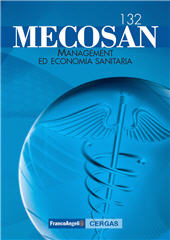Il crowdfunding in ambito sanitario : l'impatto della comunicazione sul successo delle campagne
55-71 p.
Il nuovo Accordo Collettivo Nazionale presenta numerosi elementi di innovazione e cambiamento del ruolo della Medicina Generale e del suo posizionamento nel "sistema delle cure" dell'assistenza territoriale. Tre aspetti chiave mirano a una migliore connessione e integrazione della Medicina Generale con l'intera rete dei servizi rappresentando elementi cruciali per la riuscita del percorso trasformativo: (I) forme organizzative della Medicina Generale (Unità Complesse di Cura Primarie e Aggregazioni Funzionali Territoriali); (II) connessione/integrazione con le Case di Comunità ; (III) istituzione del Ruolo Unico di Assistenza Primaria.Questi aspetti di riorganizzazione andranno coordinati con le previsioni del PNRR e DM 77/22 e la necessaria costruzione di nuovi assetti che coinvolgeranno anche il Distretto.Gli Autori, anche in base alla loro esperienza e conoscenza del settore, esaminano questi temi per definire i "nodi cruciali" di questo processo di rigenerazione organizzativa e
professionale che disancorandosi da schemi e modelli ideologici (dipendenza, presenza fisica ecc.) individui un percorso di costruzione di un nuovo network per l'assistenza territoriale.è anche difficile poter dire al momento quanto dell'ipotesi di un approccio "sistemico" della Medicina Generale potrà essere realizzato, stante il recente avvio di questo percorso innovativo.Negoziazione Collaborativa, corrispondenza delle Case di Comunità (CdC) Hub e Spoke con UCCP e AFT, Formazione Specifica per Referenti e Coordinatori UCCP, politiche regionali condivise con gli assetti e bisogni territoriali, potrebbero in questa fase avviare e favorire questo processo virtuoso di chanching management per la costruzione di un nuovo network dell'assistenza territoriale e con esso della Medicina Generale italiana.Al contrario una negoziazione regionale autoreferenziale, differenziazione CdC Hub e Spoke con UCCP e AFT, individuazione di Referenti/Coordinatori per solo ruolo "rappresentativo", politiche
regionali su CdC direzionale e/o non coerenti con assetti ed esigenze territoriali, potrebbero introdurre rigidità tali da impedire o rallentare lo sviluppo di questo processo. [Testo dell'editore]
The new National Collective Agreement introduces many elements of innovation and changes in the role of Primary Care and its positioning within the "system of care" of territorial care. Three key aspects aim to better connect andintegrate Primary Care with the entire network of services: (I) organizational forms (Unità Complesse di Cura Primarie and Aggregazioni Funzionali Territoriali); (II) connection/integration with Community Health Centers; (III) establishment of the Unified Primary Care Role.These aspects of reorganization will have to be coordinated with the forecasts of the PNRR and DM 77/22 and the necessary construction of new structures that will also involve the Local Health Organization.The Authors, also on the basis of their experience and knowledge of the field, examine these issues to define the "crucial nodes" of this process of organizational and professional regeneration that, disengaging itself from ideological schemes and models (dependence, physical presence,
etc.), identifies a path of construction of a new network for territorial care.These reorganization aspects must be coordinated with the provisions of the PNRR and DM 77/22, and the necessaryestablishment of new structures that will also involve the District. The authors examine these issues to reflect on the new role and functions that Primary Care in Italy must assume during this process of organizational and professional regeneration that, disengaging itself from ideological schemes and models (dependence, physical presence, etc.), identifying a path of construction of a new network for territorial care.It is at present difficult to be able to say how much of the hypothesis of a "systemic" approach to General Practice, will be realized given this recent innovative pathway. Collaborative negotiation, correspondence of Hub and Spoke Community Houses (CdCs) with UCCPs and AFTs, Specific Training for AFT-Referrers and UCCP-Coordinators, regional policies shared with territorial
arrangements and needs, could at this stage initiate and foster this virtuousprocess of chancing management for the construction of a new network of Territorial Primary Care and with it of Italian General Practice. On the contrary, self-referential regional negotiation, differentiation of Hub and Spoke CoCs with UCCPs and AFTs, identification of Referents/Coordinators for only a "representative" role, regional policies on directional CoCs and/or inconsistent with territorial assets and needs, could introduce rigidities that could prevent or slow down the development of this process. [Publisher's Text]
-
Articoli dello stesso fascicolo (disponibili singolarmente)
-
Informazioni
Codice DOI: 10.3280/mesa2024-132oa20678
ISSN: 2384-8804
MATERIE
PAROLE CHIAVE
- crowdfunding, comunicazione, Kickstarter, signaling theory
- crowdfunding, communication, Kickstarter, signaling theory


